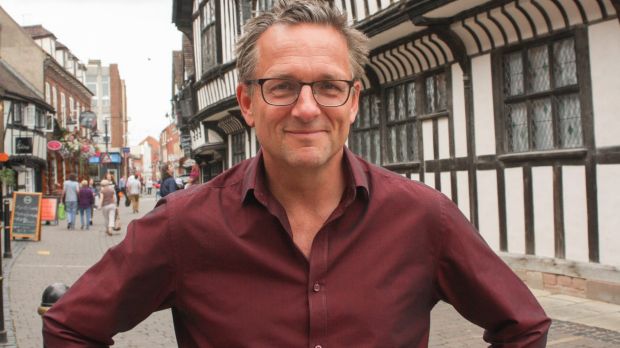It's a distinctly unsexy message to move more, eat less and eat your greens. But, break down most research about health, nutrition and exercise to its simplest form and that tends to be the message you'll find.
Dr Michael Mosley, of Fast Diet and Trust Me, I'm a Doctor fame, however believes it's an unhelpful message.

"Most of the advice we get out there is very general – as if a tennis coach said, 'Hit the ball hard into the corner and score more points than your competitor,' " Mosley says.
"Most of the advice is general and not at all helpful."

Instead, the 59-year-old GP believes the public need "very specific" messages.
"Instead of simply saying 'eat more vegetables' I would suggest that someone try intermittent fasting throughout the day – actually allow yourself to get hungry, and satisfy the hunger with some vegetables or nuts," Mosley says from his home in the UK.
"That way, you're more likely to return to vegetables next time you're hungry."
Mosley also believes it's worth getting more specific about the way we move too.
"In terms of exercise one of the things people can aim for is something called NEAT [non-exercise activity thermogenesis] ... which means simply building more activity into your normal day," Mosley explains.
He builds in more NEAT by always walking "if it's less than a mile", always taking the stairs "if it's less than seven flights", and walking up escalators.
"You can easily burn 300-400 calories by just doing that," Mosley says, "[it's the] equivalent of running a few miles and is more achievable for many people."
He also does a set of resistance exercises each morning, including press-ups and squats.
"I know that if I don't do them then, I'm never going to do them," he says. "It's a matter of having some simple rules that you're going to follow."
It has been 10 years since Trust Me, I'm a Doctor launched (the latest series starts on SBS at 7.30pm February 27) and five years since Mosley discovered he was a type 2 diabetic and went on a health journey that resulted in his best-selling book the Fast Diet and, more recently, the Blood Sugar Diet.
In that time, he has reversed his diabetes diagnosis and normalised his blood sugar levels and, in the process, learnt a lot about how to hack our health.
And while he believes the messages have to be specific, they don't have to be complicated or hard to achieve.
"I'm constantly evolving what I'm interested in – I started on the 5:2 Diet, and have become much more interested in blood sugar control, not just diabetes but also pre-diabetes and understanding how when you eat certain sugary, carby foods it sends your blood sugar soaring upwards and then your body pumps out insulin and it comes crashing downwards," explains the self-confessed "sweet tooth".
"I've become much more interested in the metabolic drivers and I'm also shifting on looking at the way that your gut bacteria influence your weight. That's what I'm musing about at the moment."
He says he is "certainly" on the kombucha train and has discovered the importance of fermented foods. With one caveat.
"There's a lot of rubbish out there at the moment, and all sorts of probiotic drinks being sold," the father-of-four says. "We did an experiment in the series where we compared the yoghurt drinks that claim to promote good bacteria and compared that to having kefir (a fermented milk drink). The yoghurt made no difference whatsoever ... we couldn't detect any difference ... but the kefir did make quite a big difference."
He adds: "There's such a big difference between the ones you buy, like sauerkraut - out of a jar and the homemade stuff. We tested sauerkraut - it didn't taste great - and the supermarket version had nothing living in it at all. Whereas the homemade version was absolutely rife with bacteria. I've been making some at home myself and ... particularly kefir is really easy to make."
It's NEAT, it's fermented, it's less carby, sugary stuff, it's allowing ourselves to get a little hungry and it's remembering that we can always improve our health and our situation with small tweaks.
"One of the main things is switching to a Mediterranean-style diet," Mosley says. "We realised that low-fat diets are not very effective.
"And understanding what a Med-style diet really is - it's not pasta and it's not pizza. It's the oily fish, nuts, olive oil and stuff like that. The evidence is pretty strong now to say that way of eating is one of the healthiest there is.
"When I wrote the Fast Diet, I wasn't all that interested in the things you ate on the fast days, and I've become much more interested in a more Mediterranean-style diet and looking more carefully at looking how much of the sugary, carby stuff you eat.
"Changing what you eat is one of the most important things you can do to lose weight and improve health."

0 comments
New User? Sign up